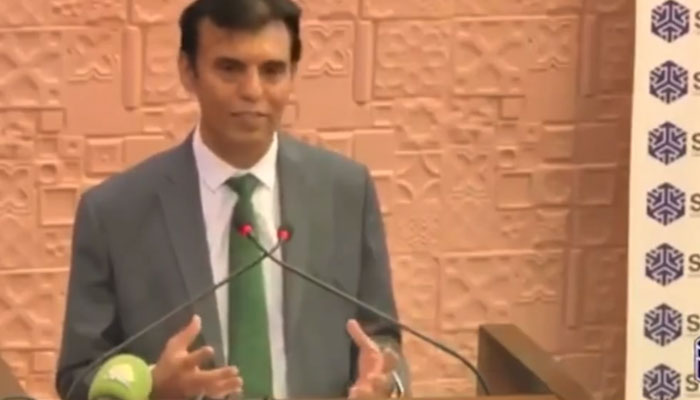Promoting solar energy through holistic policy
Islamabad: Dr Abid Qaiyum Suleri, Executive Director, Sustainable Development Policy Institute (SDPI) has said despite the government’s repeated assurances of no taxation on solar panels and reversing net-metering formula, it is pertinent to work out research-based solutions to the problem that had stirred debate in the concerned quarters.
Dr Suleri was giving opening remarks at a roundtable on “Solar net-metering conundrum: adapting solar net-metering to evolving market dynamics in Pakistan" organised by SDPI and Energy Update here Friday.
Dr Suleri said that the policy reversal scenario in the energy sector was not new as the nation witnessed such transition while shifting from diesel-based vehicles to those running on CNG fuel.
Dr Suleri mentioned that due to technology transformation, solar panels were becoming affordable that would further expedite solar energy roll out and make policy reversal on the cards.
The SDPI Executive Director mentioned that it is the duty of the think-tanks to initiate a well-informed discussion on pros and cons of the decision while considering the country’s environmental obligations, nationally determined contributions (NDCs) and Carbon Border Adjustment Mechanism (CBAM) to be implemented in 2026 with international, regional and local implication for Pakistani industry.
Touseef Farooqi, former Chairperson, NEPRA, said the floodgates have opened and no one can stop roll out of solar power technology. It will be insane to claim limiting of solar energy roll out as it will not even benefit the national grid whereas the fashion in which net metering is done it should be probed whether it is catering for the needs of the most deserving communities, he said.
He added that the cheapest electricity at Rs12.3 can be easily inducted and suggested that it should be bought with net-metering being promoted at the community scale by producing cheap electricity. The masses should avoid misuse of net-metering to avoid discrimination of poorer and contribute their share into the clean energy mix, he said.
AbuBakar from Amreli Steel said the prosumers were cross subsidised by consumers as the ancillary services at the grid were being passed on to the grid and not paid by the solar consumers.
-
 Prince William, Kate Middleton Private Time At Posh French Location Laid Bare
Prince William, Kate Middleton Private Time At Posh French Location Laid Bare -
 Stefon Diggs Family Explained: How Many Children The Patriots Star Has And With Whom
Stefon Diggs Family Explained: How Many Children The Patriots Star Has And With Whom -
 Shamed Andrew ‘mental State’ Under Scrutiny Amid Difficult Time
Shamed Andrew ‘mental State’ Under Scrutiny Amid Difficult Time -
 ‘Narcissist’ Andrew Still Feels ‘invincible’ After Exile
‘Narcissist’ Andrew Still Feels ‘invincible’ After Exile -
 Bad Bunny's Super Bowl Halftime Show: What Time Will He Perform Tonight?
Bad Bunny's Super Bowl Halftime Show: What Time Will He Perform Tonight? -
 Where Is Super Bowl 2026 Taking Place? Everything To Know About The NFL Showdown
Where Is Super Bowl 2026 Taking Place? Everything To Know About The NFL Showdown -
 Chris Pratt Explains Why He And Katherine Schwarzenegger Did Premarital Counseling
Chris Pratt Explains Why He And Katherine Schwarzenegger Did Premarital Counseling -
 Drake 'turns Down' Chance To Hit Back At Kendrick Lamar At Super Bowl
Drake 'turns Down' Chance To Hit Back At Kendrick Lamar At Super Bowl -
 Sarah Ferguson Had A ‘psychosexual Network’ With Jeffrey Epstein
Sarah Ferguson Had A ‘psychosexual Network’ With Jeffrey Epstein -
 Miranda Kerr Shares The One Wellness Practice She Does With Her Kids
Miranda Kerr Shares The One Wellness Practice She Does With Her Kids -
 Czech Republic Supports Social Media Ban For Under-15
Czech Republic Supports Social Media Ban For Under-15 -
 Khloe Kardashian Shares How She And Her Sisters Handle Money Between Themselves
Khloe Kardashian Shares How She And Her Sisters Handle Money Between Themselves -
 Prince William Ready To End 'shielding' Of ‘disgraced’ Andrew Amid Epstein Scandal
Prince William Ready To End 'shielding' Of ‘disgraced’ Andrew Amid Epstein Scandal -
 Chris Hemsworth Hailed By Halle Berry For Sweet Gesture
Chris Hemsworth Hailed By Halle Berry For Sweet Gesture -
 Blac Chyna Reveals Her New Approach To Love, Healing After Recent Heartbreak
Blac Chyna Reveals Her New Approach To Love, Healing After Recent Heartbreak -
 Royal Family's Approach To Deal With Andrew Finally Revealed
Royal Family's Approach To Deal With Andrew Finally Revealed




